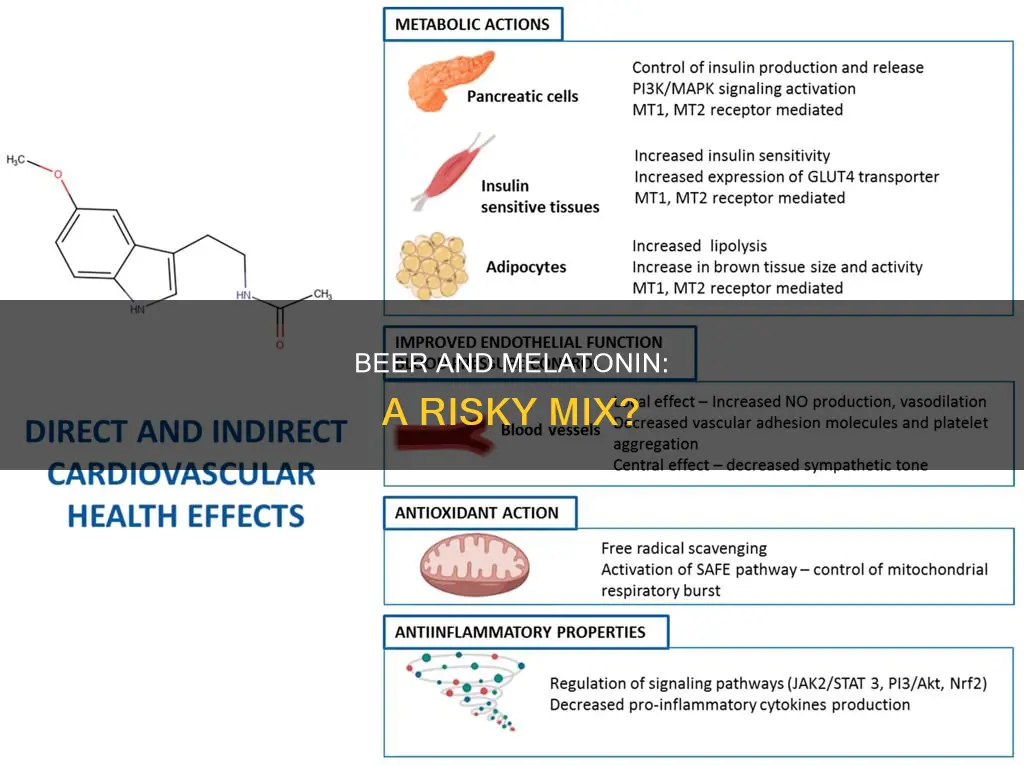
Drinking beer while taking melatonin is not recommended and can have several negative side effects. Both substances can induce drowsiness, but they do not complement each other. Alcohol can weaken or strengthen the effects of melatonin, and the combination may negatively impact your liver and ability to think clearly. It can also cause dizziness, increased anxiety, and trouble breathing, especially for those with sleep apnea. Alcohol can also disrupt your sleep patterns, reducing the effectiveness of melatonin.
| Characteristics | Values |
|---|---|
| Effect on sleep | Alcohol can prevent you from getting deep sleep and cause you to wake up more frequently throughout the night. |
| Effectiveness of melatonin | Alcohol can reduce the amount of melatonin your body can create and may make it seem like the supplement is not working. |
| Side effects | Drowsiness, dizziness, increased anxiety, trouble thinking clearly, breathing problems, raised blood pressure, swelling in feet and ankles, rapid heartbeat, and trouble concentrating. |
What You'll Learn

Increased anxiety
Mixing melatonin and alcohol can lead to heightened anxiety, which can have several adverse effects on your health.
Firstly, increased anxiety can cause irritability, making you more prone to mood changes and potentially straining your relationships with others. It can also lead to high blood pressure, which is a serious condition that can increase your risk of heart disease and other cardiovascular problems.
Moreover, the combination of melatonin and alcohol can disrupt your sleep patterns, making it difficult to fall and stay asleep. Poor sleep quality can further contribute to heightened anxiety and irritability, creating a vicious cycle.
Additionally, alcohol is known to reduce the amount of melatonin your body produces, which can further disrupt your sleep cycle. This interruption in your natural sleep rhythm can exacerbate anxiety, as adequate sleep is crucial for maintaining emotional balance and managing stress.
To avoid these potential issues, it is recommended to separate the consumption of alcohol and melatonin by a significant amount of time, or avoid mixing them altogether.
Understanding Beer's Alcohol Content: How Much is a Drink?
You may want to see also

Poor sleep
Drinking beer while taking melatonin can negatively impact your sleep quality. While melatonin is a hormone that helps regulate your body's sleep-wake cycle, alcohol can disrupt this cycle and negatively impact your sleep in several ways.
Firstly, alcohol is known to interfere with your ability to reach REM sleep, the deepest and most restorative stage of sleep. Even if it helps you fall asleep initially, you are likely to experience interrupted sleep and wake up frequently throughout the night. This can result in non-restorative sleep and leave you feeling tired and mentally foggy the next day.
Secondly, the combination of melatonin and alcohol can lead to excessive drowsiness and impaired coordination. This heightened sedation can disrupt cognitive function and slow reaction times, increasing the risk of accidents and injuries.
Additionally, alcohol can affect your body's natural melatonin production. It reduces the amount of melatonin your body creates, further disrupting your sleep cycle. Alcohol can also cause muscles around your airways to work differently, affecting your breathing during sleep. This can be especially problematic if you have a breathing issue such as sleep apnea.
The combination of melatonin and alcohol can also have potential health complications. Both substances are metabolized by the liver, and combining them can put extra strain on this organ, potentially leading to liver damage over time. This risk is particularly significant for heavy drinkers or those with pre-existing liver conditions.
In summary, while you may fall asleep faster when drinking beer and taking melatonin, the quality of your sleep is likely to be significantly reduced. This can lead to fragmented sleep, frequent awakenings, and an overall feeling of tiredness upon waking. Therefore, it is not recommended to combine alcohol and melatonin due to the negative impact on sleep quality and the potential health risks involved.
Beer, Valsartan, and Amlodipine: Is It Safe to Drink?
You may want to see also

Fuzzy thinking
Alcohol can interfere with your body's ability to reach REM sleep, which is the deepest and most restorative level of sleep. While it may initially make you feel sleepy, it can also prevent you from staying asleep for long. This disruption to your sleep patterns may also mean that melatonin loses its effectiveness.
Additionally, alcohol can reduce the amount of melatonin your body naturally produces. This can further interrupt your sleep cycle. Alcohol can also affect your breathing by impacting the muscles around your airways. This can cause or worsen sleep problems, especially if you have sleep apnea.
The combination of alcohol and melatonin can also lead to other side effects such as dizziness, increased anxiety, and trouble walking. There may also be complications involving your liver and how it produces certain enzymes. It is therefore recommended to avoid mixing alcohol and melatonin.
Drinking Beer in Public: NYC's Laws and Where to Enjoy
You may want to see also

Dizziness
The potential for dizziness is one of the reasons why it is generally advised to avoid mixing melatonin and alcohol. Alcohol can interfere with the effectiveness of melatonin and may cause serious complications. It can either weaken or strengthen the effects of melatonin, leading to unpredictable outcomes.
Additionally, alcohol disrupts sleep patterns, which may further impact the effectiveness of melatonin as a sleep aid. Alcohol is known to reduce the amount of melatonin that your body can produce, interrupting your natural sleep cycle. This interruption can lead to poor sleep quality, which may compound the dizziness and other side effects associated with the combination of melatonin and alcohol.
In conclusion, dizziness is a possible side effect of consuming melatonin and alcohol together, and this dizziness can be dangerous in certain situations. It is recommended to avoid mixing melatonin and alcohol due to these potential side effects and the negative impact on sleep quality. If you experience dizziness or other side effects, it is important to stop what you're doing and seek medical attention if necessary.
London's Favorite Beer: A Local's Guide to Drinking
You may want to see also

Liver problems
Mixing melatonin and alcohol can have adverse effects on the liver. Alcohol is known to interfere with the effectiveness of medications and supplements, and melatonin is no exception. When combined with alcohol, melatonin may have weakened or strengthened effects.
The liver plays a crucial role in metabolizing both alcohol and melatonin. When you mix these substances, it puts extra strain on the liver, which can contribute to liver damage over time. This risk is particularly significant for heavy drinkers or those with pre-existing liver conditions.
Additionally, melatonin can regulate the circadian rhythm and alleviate insomnia and jet lag. However, when combined with alcohol, melatonin's effectiveness may be reduced, and it can negatively impact sleep quality.
It is recommended to consult a healthcare professional before taking melatonin, especially if you have a pre-existing liver condition or are a heavy drinker.
Jackfruit and Beer: A Risky Culinary Adventure?
You may want to see also
Frequently asked questions
It is not recommended to mix alcohol and melatonin. Alcohol can reduce the amount of melatonin your body naturally makes, and it may seem like alcohol reduces the effectiveness of the supplement. There are also potentially dangerous side effects, including dizziness, increased blood pressure, and anxiety.
The combination of alcohol and melatonin can cause negative side effects such as drowsiness, dizziness, increased anxiety, and trouble breathing. It can also affect your liver and its ability to create certain enzymes.
If you have been drinking, it is recommended to wait 2-3 hours before taking melatonin. This is because alcohol can interfere with your sleep patterns and the effectiveness of the supplement.
Alcohol can either weaken or strengthen the effects of melatonin. It can also disrupt your sleep patterns, which may mean that melatonin becomes less effective.
While there is no specific information about drinking beer after taking melatonin, it is generally advised to avoid alcohol when taking melatonin. This is because alcohol can interfere with the effectiveness of the supplement and cause negative side effects.







